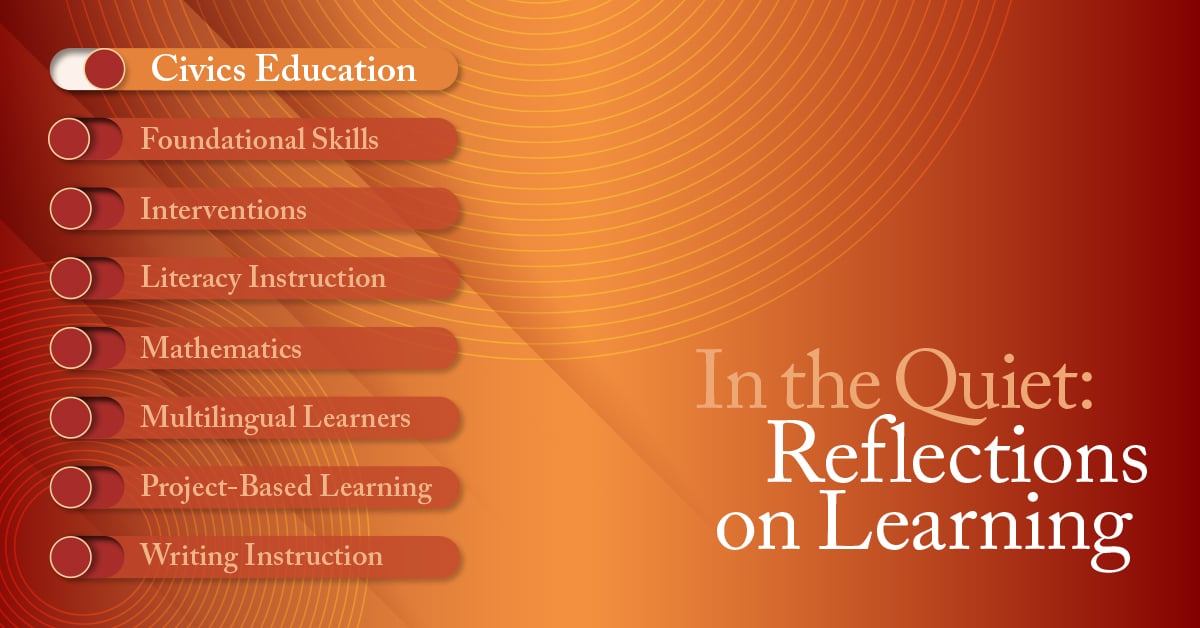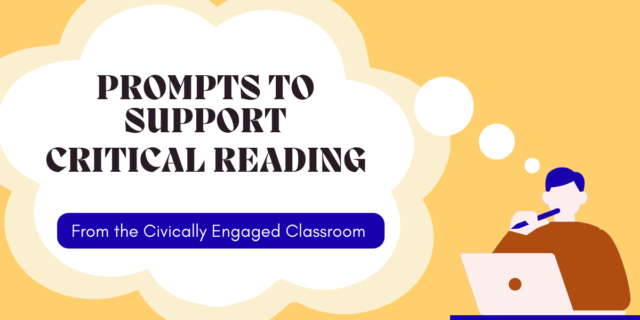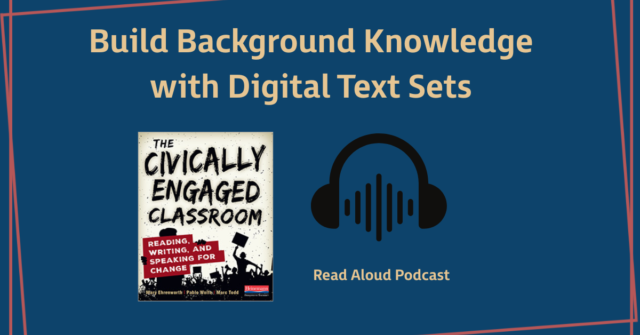 Teaching is a profession that elicits a myriad of questions throughout the day, from the rhetorical to pedagogical. Finding intellectual space to ponder these questions in a way that will impact practice can be tough, and we want to help. Our new series, “In The Quiet: Reflections on Learning” invites you into the mind of an expert in the field through a brief Q&A. So, wherever your quiet is—after the bell, on the commute, or elsewhere—please enjoy this space to reflect as you hone your craft.
Teaching is a profession that elicits a myriad of questions throughout the day, from the rhetorical to pedagogical. Finding intellectual space to ponder these questions in a way that will impact practice can be tough, and we want to help. Our new series, “In The Quiet: Reflections on Learning” invites you into the mind of an expert in the field through a brief Q&A. So, wherever your quiet is—after the bell, on the commute, or elsewhere—please enjoy this space to reflect as you hone your craft.
Today we hear from Pablo Wolfe, a Washington, D.C.-based educator who promotes civic education as a means to improve student engagement, celebrate student identity, and embolden the next generation of citizens. He is the co-author of The Civically Engaged Classroom: Reading, Writing, and Speaking for Change and the Unit of Study: Historical Fiction Book Clubs.
![]()
Why is it hard to find time to teach something so important as civics?
![]()
Well, let’s first get to the sticky question of defining the word civics. If you define civics the way most of our high school courses did, as the memorization of key figures, philosophical ideals, and government structures, then no, there’s no time for all that when you have to teach reading, writing, science, math, art, music, and other disparate subjects.
I favor the more expansive term civic learning. If we think of all the elements of what goes into being an engaged participant in the social life of our local, state, and national communities, knowledge of historical figures, ideals, and government structures are certainly helpful to know, but are hardly the only elements that contribute to a person’s social efficacy; they’re not even the most important ones! The term civic learning goes beyond just gathering a knowledge base about our democratic institutions and history, to include social problem-solving, accepting difference, deliberation with others, and addressing the needs of the vulnerable. These are the moral, ethical lessons that should animate the study of any discipline. Civic learning isn’t a subject, per se, it’s an answer to the question: Why do I need to learn this?
So, for me it’s less a question of finding time and more a question of using civic goals to drive whatever subject you are teaching. There is a long intellectual history in the United States that has seen education as inherently tied to the success, or failure, of our democracy. Whether it's contemporary thinkers like Amy Guttman, Meira Levinson, or Goldhy Muhammad in the present, or John Dewey and Horace Mann over a century ago, the idea that our education system was designed to create citizens is an old one. Check your school mission and vision statements and I’m sure you’ll find some combination of the words “citizen/citizenship,” “participation in society,” and “critical thinkers.” The ideas are there in our organizing documents, but it’s one thing to pay lip service to them, quite another to practice them.
![]()
How do we inspire and engage students toward active citizenship when they aren’t even old enough to vote?
![]()
There’s a wonderful teacher that I work with through the Coalition of Civically Engaged Educators network named Joel Snyder, who works with high school students in Los Angeles. Around election time, they do this incredible work where they consider their identities, the issues that matter to them and their loved ones, and the needs of their communities. Then, they weigh those next to ballot initiatives and candidate platforms. The students, though still short of voting age themselves, study the issues and candidates deeply. They do interviews within the community and read extensively before writing comprehensive bilingual voter guides. They then take these guides home and use them to educate an eligible voter.
But the assignment doesn’t end there! Afterwards, they accompany that voter to the polls and and as a wrap-up, the voter they brought to the polls is asked to share their voting reflections with the class in the language of their choosing. They may be young, but with Joel’s guidance, these high schoolers get a much better understanding of their civic responsibilities than I did at their age. Joel creates a classroom experience that provides for a lot of freedom for students to explore what matters to them within a clear framework defined by the voting guide project. It also helps that the learning extends beyond the classroom walls. Young people have ideas, passions, and a desire to influence the world; school should give them the skills, structure and opportunities to do so.
I just recently read this adorable example of civic participation from a 6-year-old named Madeline in LA county, who wanted to know whether it was legal to keep a unicorn in her backyard. She wrote a letter respectfully framing her question and addressed it to county officials at animal control who were so delighted by her effort that they issued her a “pre-approved unicorn license.” At age 6, this little citizen learned that there were offices dedicated to the protection of animals and that they could be directly appealed to with an individual concern.
![]()
There seem to be infinite possibilities for tying in civics content with necessary skills: close reading, analytical and expository writing, critical thinking, statistical numeracy, SEL, social studies content, 21st Century literacy skills... Could civics be the most flexible (and important) way to meet a multitude of standards?
![]()
Amen! Absolutely! I think of educational experiences in schools as having three major components: developing a knowledge base, integrating and sculpting knowledge through academic skills, and applying skills and knowledge towards civic learning goals. To use a simple metaphor: our knowledge base is the raw material, like bricks, the skills are the tools, the trowel and mortar, and the civic learning is the bridge we make between the child and the world around them.
In this conception of civic learning, you can insert any knowledge/skills combination as long as you’re asking yourself: Where does this bridge lead? How is our application of these skills and knowledge useful to the child in better understanding and caring for the world they live in?
![]()
As a learner, what professional learning experience has had the most positive impact on your teaching career?
![]()
I’d say the best professional learning experience for me was working with Akeem Barnes and Aaron Hinton at Riverdale Avenue Middle School in Brooklyn, NY. At the time, Akeem was an 8th grade humanities teacher and I was his staff developer from the Teachers College Reading and Writing Project. We decided to apply civic learning goals to our literacy instruction and to end the year with a classroom-based civic action. I enlisted Aaron to help us since he was an activist and organizer in the community around the school and knew far more than either of us about the operations of local government and the active citizens groups that we could connect with.
Together, we created a project where Akeem’s 8th grade class explored the history of past and present police relations with the community. With Aaron’s expertise and Akeem’s guidance, the students conducted both reading research and active community research, I call these “seat” and “feet” research. They were led to the local library by elders in the community, they researched text sets assembled by the librarian, and they also conducted surveys of their own design about police-community relations. Through Aaron’s connections with the local precinct, Akeem was able to bring officers into the classroom to share their perspectives. In the end, the students found that only 44% of the 200 people they interviewed knew there was a Citizen Complaint Review Board where citizens could lodge complaints about police interactions. Consequently, they decided to present their findings to the community at an open Town Hall meeting hosted at the school.


